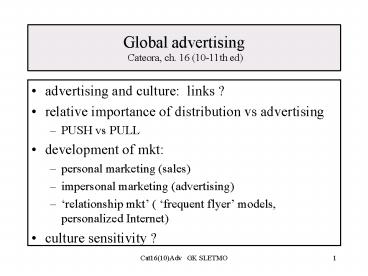Global advertising Cateora, ch' 16 1011th ed - PowerPoint PPT Presentation
1 / 11
Title:
Global advertising Cateora, ch' 16 1011th ed
Description:
impersonal marketing (advertising) ... Pattern Advertising ' ... Advertising agencies and standardization. among the first to promote concept of ' ... – PowerPoint PPT presentation
Number of Views:179
Avg rating:3.0/5.0
Title: Global advertising Cateora, ch' 16 1011th ed
1
Global advertising Cateora, ch. 16 (10-11th ed)
- advertising and culture links ?
- relative importance of distribution vs
advertising - PUSH vs PULL
- development of mkt
- personal marketing (sales)
- impersonal marketing (advertising)
- relationship mkt ( frequent flyer models,
personalized Internet) - culture sensitivity ?
2
Key Concepts
- world brand and pattern advertising
- plan globally, act locally
- global market segmentation
- creative challenges
- legal constraints
- language limitations (translation and idioms /
images) - cultural diversity
- media constraints
- media planning (availability, local content)
3
More useful concepts to watch for
- Constraints on effectiveness of promotional
programs - Absence/presence of common language
- Availability cable/ satellites
- Government control of TV
- Availability of media research
- Noise (competitive) in TV markets
- Regional market segments cross-border
- Media budgets trade-offs creativity vs mass
coverage - Sales promotion vs advertising (short/long term
effectiveness)
4
Changing Visions of Marketing Over Time
- product orientation (engineering view)
- sales orientation (persuasion - traditional
sales role) - marketing concept (consumer behavior - 4Ps)
- Consumer is King
- competitive advantage(industrial organization -
economics) - emphasis on horizontal competition
- relationships (alliances) (political science -
political economy) - power and cooperation
- distribution channels Retailer is King
5
Pattern Advertising global strategy (a single
basic message) but with local adaptation in
execution - when necessary
- core product remains same across borders
- use and perceptions may be different
- psychological and other attributes may vary
- examples?
6
Promotional mix a six-step process
- 1. analyze target markets
- 2. determine degree of possible standardization
- 3. determine optimal mix promotional mix optimal
(advertising, personal sales, merchandising,
public relations) - 4. develop effective messages
- 5. choose appropriate media among those available
- 6. establish a global feedback / control system
7
Advertisings task the most culture sensitive
variable in mkt ?
- interpret and translate a products capacity to
satisfy needs and desires using - symbols
- style (incl. life style and design)
- values
- beliefs
8
The key dimensions of advertisingimportance of
culture?
- persuasion - how?
- rational arguments? softly or aggressively?
- intuition? images? (which?)
- information - how?
- facts? statistics?
- comparisons? images or words?
- level of complexity?
- reveries - dreams
- acceptable images?
9
Advertising risk of inter-cultural distortion
of messages see Exh. 16-5, p. 509
- culture shared experiences and reference fields
- different cultures different fields
senders reference field and experience
receivers reference field and experience
DECODING
SENDER
CODING
MESSAGE
RECEIVER
FEEDBACK
10
Advertising agencies and standardization among
the first to promote concept of global
products (cf. Levitts 1983 article)
- Strategy cycles ?
- a new trend towards greater diversity ? variety ?
- adapt standardize adapt ?
- impact of new technologies
- from mass marketing towards individualized
marketing ?
11
Advertising - a passion for varietyThe
Economist, 961130 68, 71.
- Levitt on Variety
- in 1983 his famous article predicted a world of
global markets for globally standardized
products - now he says only half the story
- low cost transport ad communications will bring a
large variety of new products - consumers experiment, broaden consumption































